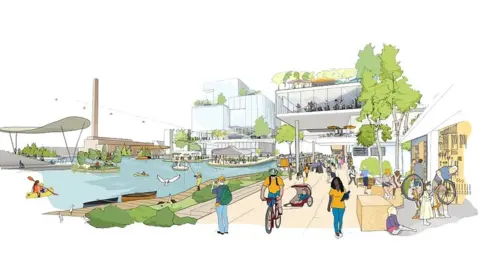Google's 'secret' smart city on Toronto's waterfront sparks row
 Getty Images
Getty ImagesGoogle's Sidewalk Labs has big plans for Toronto's waterfront. The problem is, nobody seems to know what they are.
Ever since a Google-affiliated company announced that it would be building a "smart city" on the Toronto waterfront, rumours have swirled about what kinds of futuristic tech might be in store.
Would there be flying cars like in the Jetsons? Teleportation like in Star Trek? And more importantly, in light of Cambridge Analytica's misuse of millions of Facebook users' data, what would the company be doing with all the user information it collects?
For now, most of these questions will have to remain unanswered, much to the chagrin of the hundreds of Torontonians who attended public meetings on Tuesday and a number of city officials who are growing wary of corporate vagaries.
"The public has a right to know… the contents of a deal of this significance and this importance," Deputy Mayor Denzil Minnan-Wong told the BBC.
"In any deal I get something and you get something."
"What exactly are we getting from Sidewalk and what are we giving for it?"
The project was commissioned by the publically funded organisation Waterfront Toronto, who put out calls last spring for proposals to revitalise the 12-acre industrial neighbourhood of Quayside along Toronto's waterfront.
Prime Minister Justin Trudeau flew down to announce the agreement with Sidewalk Labs, which is owned by Google's parent company Alphabet, last October, and the project has received international attention for being one of the first smart-cities designed from the ground up.
 Sidewalk Labs
Sidewalk LabsBut five months later, few people have actually seen the full agreement between Sidewalk and Waterfront Toronto.
As council's representative on Waterfront Toronto's board, Mr Minnan-Wong is the only elected official to actually see the legal agreement in full. Not even the mayor knows what the city has signed on for.
"We got very little notice. We were essentially told 'here's the agreement, the prime minister's coming to make the announcement,'" he said.
"Very little time to read, very little time to absorb."
Now, his hands are tied - he is legally not allowed to comment on the contents of the sealed deal, but he has been vocal about his belief it should be made public.
"Do I have concerns about the content of that agreement? Yes," he said.
"What is it that is being hidden, why does it have to be secret?"

Analysis - Jane Wakefield, technology reporter
When I spoke to Dan Doctoroff, the chief executive of Sidewalk Labs, he told me that the plans for the waterfront city would be all about improving the lives of the citizens living there, and that would include extensive collaboration with them.
He also acknowledged that in the past, technology and urban planning have not been the most comfortable of bedfellows and that smart city plans are often imposed on those living there with little consultation or explanation.
He wanted his team to work better with the community, but clearly so far that hasn't happened.
It is not surprising that citizens are wary of the partnership. Tech firms are currently under increasing scrutiny for how they capture, store and use people's data.
The idea of a city built from the internet up sounds intriguing but, in the current climate, it is bound to raise questions about privacy.
As to the details of what will be in the city - it is very likely to be a testbed for driverless cars, another pet project of Alphabet's - but beyond that, nothing is yet written in stone.
Mr Doctoroff wants citizens to help decide what the city they live in looks like and his team needs to get on with this if it is to win back the trust of Toronto's inhabitants.

A spokesperson for Waterfront Toronto said it did not want to make the preliminary deal public until all negotiations were finalised, and said it intends to release the next iteration of the deal soon.
As for privacy, Sidewalk Labs says it takes that very seriously, and is working with former Ontario privacy commissioner Ann Cavoukian to try and set a global-standard for how smart-cities should treat users data.
But the specifics, including how data will be collected and where it will be stored, remain thin.
"There are a lot of questions we've got to work through over the month ahead, and we are very conscious of not wanting to short circuit the public consultation process and the expert consultation process we are working on," Micah Lasher, head of policy and communications at Sidewalk Labs told the BBC.
